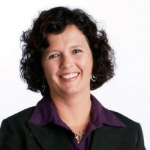In This Section

Rochelle Hilson
Senior Vice President - COO of IBF Division, North Mill Capital
Biography:
Rochelle has over 22 years of experience in the finance industry. She began her career at Principal Resources, LLC, now North Mill Capital LLC, in an entry level accounting position. In her time with the company, she has managed the accounting function, worked with lenders, managed a portfolio of factoring clients and currently manages the factoring portfolio and overseas North Mill Capital’s Minnesota office.
She is currently a senior vice president and COO of the IBF Division at North Mill Capital. She is responsible for monitoring the credit quality and performance of the invoice-based financing (factoring) portfolio. She works hand-in-hand with the legal, underwriting and business development teams to ensure that the portfolio is served and risk is properly managed.
Rochelle possesses a Bachelor of Arts degree in accounting from the University of Minnesota’s Carlson School of Management. She has taken MBA classes and completed the Minnesota Executive Program at the Carlson School of Management. She has also attended webinars and workshops in leadership and other lending-related areas. She has participated on the board of directors of a local non-profit and remains on the non-profit’s finance committee. Rochelle is a member of the TMA, RMA and SFNET.
What advice would you offer to women just starting out in the industry?
I would advise women starting out in the industry to be a good listener and observer and not to be afraid to ask questions, take chances or try something new. If a situation is making you feel outside your comfort zone, take a breath, lean in and go for it. I have found that some of the things I was most afraid to try ended up being the most rewarding. I know that the first networking events I attended seemed a bit overwhelming, but it might help to set a goal of meeting 2-3 new people at an event, know that others may not be comfortable too and practice making conversation. Having a non-work related hobby or interest or reading a business-related or skill-related book and inviting a colleague or friend to join you with the hobby or reading the book can help with building relationships too. I have read The 21 Irrefutable Laws of Leadership with my mentor and with my direct reports, which helped with my own growth and development while helping to build relationships with my peers. I would recommend learning to play golf since many business-related organizations have networking events at the golf course. I would also say that it is good to be aware of your core values and be confident in speaking up or making decisions to stay in alignment with your core values.
What do you know now that you wish you knew in the beginning of your career?
I’m a perfectionist, and in the beginning of my career, I wish I would have been more confident in my abilities and more willing to speak up. I think I was afraid to make mistakes and sometimes struggled with receiving feedback; so, having a thick skin, not taking things too personally, and knowing that it is OK to make mistakes can be critical to surviving. I learned very quickly that being able to effectively manage my time was important. Work on developing, practicing, and maintaining time management skills.
What kind of role has mentoring and/or sponsorship played in your career?
Having a mentor helped me to gain perspective and confidence. I was fortunate to have a mentor that believed in me and pushed me to go outside my comfort zone. As a result, I developed more confidence and became eager to take on new challenges. I have also served the role of mentor with colleagues and that has helped me to build stronger relationships with them as well as improving how we work together as a team.
What do you think the industry could do to attract and retain the best and the brightest today?
I think the industry could work on educating and making people more aware of what opportunities exist in the commercial finance industry, especially at the high school and college levels. Having networking events that are not sport-related or at the golf course and that involve activities of interest to women might help attract women to the commercial financing industry. Creating and offering more leadership opportunities for women in the workforce and creating an environment that is more accepting and encourages women to work on maintaining a balance between work and family should help with retaining superstars. Offering continued training and mentorship throughout one’s career and advocating for various women in business organizations or affiliates that are supportive and provide resources for women in commercial finance might help retain star candidates.
Professional Development Courses
- Live online classes for ABL and Factoring professionals
- On Demand classes in Appraisals, Factoring, Legal, Workout & Bankruptcy
